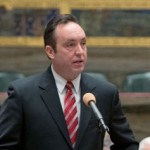Insurance Rate Shock Coming for Young, Healthy People
2014 could prove to be a tumultuous year for health insurance rates. Pennsylvania Insurance Commissioner Michael Consedine said as much when answering questions from members of the state House Appropriations Committee this week.
Consedine says some segments of the population are likely to experience what he calls “rate shock,” upon full implementation of the Affordable Care Act next year. “Ironically it’s most likely going to be young, healthy individuals who right now are getting the benefit of being young and healthy, and therefore that’s allowed in the underwriting process, and their premiums reflect that,” Consedine says. “That rating formula goes away with the Affordable Care Act.”
“You have it currently low for young people, and high for older and less healthy people,” Deputy Executive Insurance Commissioner Randy Rohrbaugh said, using a metaphorical seesaw analogy, “That seesaw changes. Actually there will be winners and losers, and I think there’s going to be sticker shock on the side of the young, healthy people.”
Sticker shock to the tune of 60% or more, Rohrbaugh estimates.
The theory, he says, is that any disruptions in health insurance rates will be short-lived. However, he cautions that it could be a longer stabilization process should those young people opt-out of the health insurance system, and choose to take the penalty instead, under the Affordable Care Act.
“It may take two or three years before that all will level through.”












